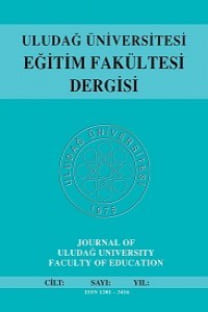Matematik Öğretiminde Gelişmeler
Bu çalışmada önce matematik ve matematik öğretiminden ne anlaşıldığı hususundaki gelişmeler özetlenmiş, sonra matematik öğretimi ile ilgili çağdaş öğrenme kuramlarından yapısalcı öğrenme ve gerçekçi matematik eğitimi tanıtılmış, bunların benzerlikleri, farklılıkları ve uygulanabilirlik düzeyleri üzerinde durulmuştur. Günümüzde matematik öğretiminin hedefinin, sürecin kazanımı ve matematiksel yatkınlık kazandırma olduğu dikkate alınarak, buna uygun öğrenme ortamında ve öğretim etkinliklerinde bulunması gereken dört temel özellik belirlenmiştir. Bu özellikler, bilgiyi bireyin kendisinin oluşturduğu, öğrencinin zihinsel faaliyetlerini kendisinin düzenlemesi, öğretimi bir bağlam içinde ele alma ve problem çözme yeteneklerini geliştirme olup bunların nasıl sağlanabileceği tartışılmıştır
Anahtar Kelimeler:
Yapısalcı öğrenme, gerçekçi matematik eğitimi, matematik yapmaya yatkınlık.
Matematik Öğretiminde Gelişmeler
Keywords:
-,
___
- Altun, M. (2006). The Teacher Trainees’ Skills and Opinions on Solving Non- Routine Mathematical Problems. Paper presented at the 3rdInternational Conference on the Teaching of Mathematics, İstanbul
- Cai, J. (2003). Singaporean students mathematical thinking in problem solving and problem posing: an exploratory study. International Journal of Mathematical Education in Science and Technology. 34(5), 719–737.
- De Hoyos, M., Gray, E., Simpson, A. (2002, July). Students assumptions during problem solving. Paper presented at the 2nd International Conference on the Teaching of Mathematics. Crete, Greece.
- De Corte, E. (2004). Mainstreams and perspectives in research on learning (Mathematics) From Instruction. Applied psychology, (53)2, 279–310.
- Doolittle,P. File://F:\Consructivism and Online Education(Doolittle).htm
- Fitzpatrick, C. (1994). Adolescent mathematical problem solving: The role of metacognition, strategies and beliefs. Paper presented at the annual meeting of the American Educational Research Association, New Orleans, LA.
- Gravemeijer, K., Hauvel M. V. & Streefland, L. (1990). Context free productions test and geometry in realistic mathematics education. the Netherlands: State University of Utrecht.
- Hauvel-Panhuizen, M. (1996). Asserment and Realistic Mathematics Education, Technicpress, Netherland.
- Kaur, B. (2001, October). Singapore’s school mathematics curriculum for the 21th century. Paper presented at the meeting of Qualifications and Curriculum Authority on the Reasoning Explanation and Proof in School Mathematics and Their Place in the Intended Curriculum, Cambridge, UK.
- Nancarrow, M. (2004). Exploration of metacognition and nonroutine problem based mathematics instruction on undergraduate student problem solving success. Unpublished doctoral dissertation, The Florida State University, Florida.
- Pape, Stephen J., Wang, C.(2003).Middle school children’s strategic behavior: Classification and relation to academic achievement and mathematical problem solving.hstructional science. 31, 419–449.
- Santos-Trigo, M.(1998). Instructional qualities of a successful mathematical problem solving class. International Journal of Mathematical Education in Science and Technology. 29(5), 631–646.
- Schopnfeld, A.H. (1988). When good teaching Peads to Bad Results: The disasters of “well tauhgt” Mathematics Courses, Educational Psychologist, 23(2).
- Skemp, R. E. (1986). The Psychology of Learning Mathematics. UK: Penguin Books.
- Tomic, W., Nelissen j. (1998). Representations in mathematics education. Hearken. ERIC Document Reproduction Service No. ED 428950.
- Vershaffel, L., De Corte, E., Lasure,s., Vaerenbergh, Bogaerts, H.& Ratinckx, E. (1999). Learning to solve mathematical application problems: a desing experiment with fifth graders. Mathematical Thinking and Learning, 1(3), 195–229.
- Zimmerman, B.J. ve Martinez- Pons, M. (1986). Development of a structured interview for assessing student use of self-regulated learning strategies. American Educational Research Journal 23: 614-628
- The Development in Mathematics Teaching
- Başlangıç: 1986
- Yayıncı: Bursa Uludağ Üniversitesi Eğitim Fakültesi
Sayıdaki Diğer Makaleler
Merkezi Epistemolojik İnançlar Ölçeğinin Geliştirilmesi: Geçerlik ve Güvenirlik
Aynur OKSAL, Erkan ŞENŞEKERCİ, Asude BİLGİN
Özel Okul ve Devlet Okulu Öğrencilerinin Matematik Kaygı Düzeyleri Üzerine Bir Araştırma
Matematik Öğretiminde Gelişmeler
In Service Training of ELT Teachers in Turkey Between 1998-2005
Murat DEMİRBAŞ, Rahmi YAĞBASAN
Almanca Öğretmenliği Bölümlerinde Seçmeli Kırk Kredilik İngilizce Dersinin Etkileri
Murat DEMİRTAŞ, Rahmi YAĞBASAN
Erarbeitung eines Unterrichtskonzepts für die Konkrete Poesie im Fremdsprachenunterricht
